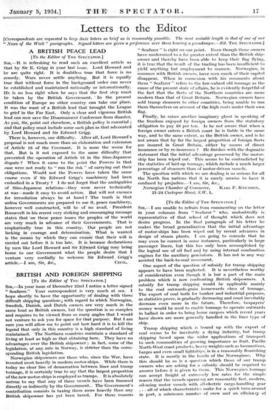BRITISH AND FOREIGN SHIPPING
[To the Editor of THE SPEcTsTon..] Sm,—In your issue of December 22nd I notice a letter signed "Seafarer." Your correspondent is very, much at sea. I hope shortly to have ,the opportunity of dealing with these difficult shipping questionpi with regard to which Norwegian, Swedish, Danish, and Dutch owners are very much in the same boat as British owners, but the question is so complex and requires to be viewed from so many angles that I would not venture to ask you for space for that purpose. But I am sure you will allow me to p_oint out how hard it is to kill the legend that only in this country is a high standard of living maintained. The Northern countries maintain a standard of living at least as high as that obtaining here. They have no advantages over the British shipowner ; in fact, some of the legislation, at any rate in Norway, is stricter than the corre- sponding British legislation.
Norwegian shipowners are those who, since the War, have invested most heavily in modern motor-ships. While there is today no clear line of demarcation between liner and tramp tonnage, it is certainly true to say that the largest. proportion of the new motor-ships is employed as tramps.. It is absolutely untrue to say that any. of these vessels have been financed directly or indirectly by the Government.- The Government's contribution consists in taxing them more heavily than any British shipowner has yet been taxed. For these reasons " Seafarer " is right on one point. Even though those owners have modernized to a far greater extent than the British ship- owner and thereby have been able to keep their flag flying, it is true that the result of the trading has been insufficient to yield anything but employment to seamen. Norwegian, in common with British owners, have seen much of their capital disappear. When in connexion with his comments about them " Seafarer " refers to the low-valued old tonnage as the cause of the present state of affairs, he is evidently forgetful of the fact that the fleets of the Northern countries are more modern than that of Great Britain. Norwegian owners have sold tramp steamers to other countries, being unable to run them themselves on account of the high costs under their own flag. - Finally, he raises another imaginary ghost in speaking of the freedom enjoyed by foreign owners from the statutory obligation to pay £8 per ton. Is he not aware that when a foreign owner enters a British court he is liable in the same way, and to the same extent, as the British owner, and is he not aware that by far the largest proportion of foreign fleets are insured in Great Britain, either by means of direct insurance or by re-insurance ? He finishes with the dogmatic statement that the initial advantage possessed by the motor- ship has been wiped out. This seems to be contradicted by the statistics of laid-up tonnage, which include a much larger percentage of steamers than of motor-driven vessels.
The question with which we are dealing is so serious for all the North Sea nations that it is surely unwise to have it confused by prejudice.—! am, Sir, &c., Norwegian Chamber of Commerce, KARL F. KNUDSEN. 21-24 Cockspur Street, S.W. 1.






































 Previous page
Previous page